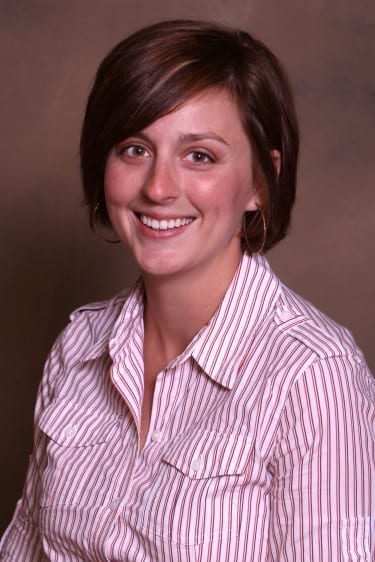
Poore is a resident at UnityPoint Health System (formerly Iowa Health) in Des Moines, IA. She grew up in Orlando, FL, and lived there until coming to Iowa to attend DMU. Dr. Poore studied biology and completed a minor in chemistry at the University of Central Florida in Orlando. As an undergrad, she got into a groove of surfing every Sunday, regardless of her workload, and also utilized a longboard skateboard to get around the massive college campus (a fun commute between classes). She worked a full-time job all the way through school, using the extra money to go to England for a summer to study literature and its corresponding art, something she considers to be one of the best decisions of her undergrad experience. Since moving to Iowa, she de-stresses with baking and, since she can’t surf (or really skateboard) here, she goes snowboarding every winter.
How did you decide what residency you wanted?
My first priority in a residency was the willingness to teach exhibited by the faculty. I observed how the residents interacted with their attendings, as well as the direction given to residents in surgery. Size didn’t matter to me; neither did geography. Residency is three years – that’s all you get for your training, and I wanted to go a place I thought would optimize that time for me. I decided I could make concessions on something like location as it would be temporary. Workload didn’t matter to me, either (whether high or low) – I prefer to be busy, and even if I’m not busy enough with working then I know it’s my job as a resident to be busy learning on my own and reading up. I recognize it’s my responsibility to maximize my residency experience, not the job of my attendings or co-residents, although their willingness to teach is definitely important. If you’re willing to work hard and learn, I found you can really get along with everybody. Generally, egos result in personality clashing, so I’ve tried to remain humble throughout my fourth year and as a resident.
Describe the structure of your residency program—what rotations have you done, what kinds of patients have you seen and what procedures have you done?
I’ve completed internal medicine, pathology, radiology, behavioral medicine and anesthesia, and I’m doing emergency medicine right now. I see all kinds of patients, though not too many kids. I’ve scrubbed in on a large variety of procedures such as bunion and hammer toe corrections, neuroma excision and amputations.
What was it like moving on from your time at DMU and becoming a “real” doctor?
It was a little stressful to have a lot of new responsibility but at the same time I knew what was expected of me (and if I didn’t, then I asked). When you enter that next stage, there are a lot of people available to help. Sometimes you may forget, but the attending physicians are there to be your educators and teach you how to be a “real” doctor. Being open to learning and accepting that you might make mistakes will help make this transition easier (as long as you learn from those mistakes). The hardest thing was getting used to introducing myself as “Dr. Poore” instead of “Rachael.”
Did you feel prepared for residency?
Yes, I felt ready. But of course there are always things that come up along the way that you may have never considered. Again, just learn as you go and you’ll be fine; never let your ego get in the way of learning.

